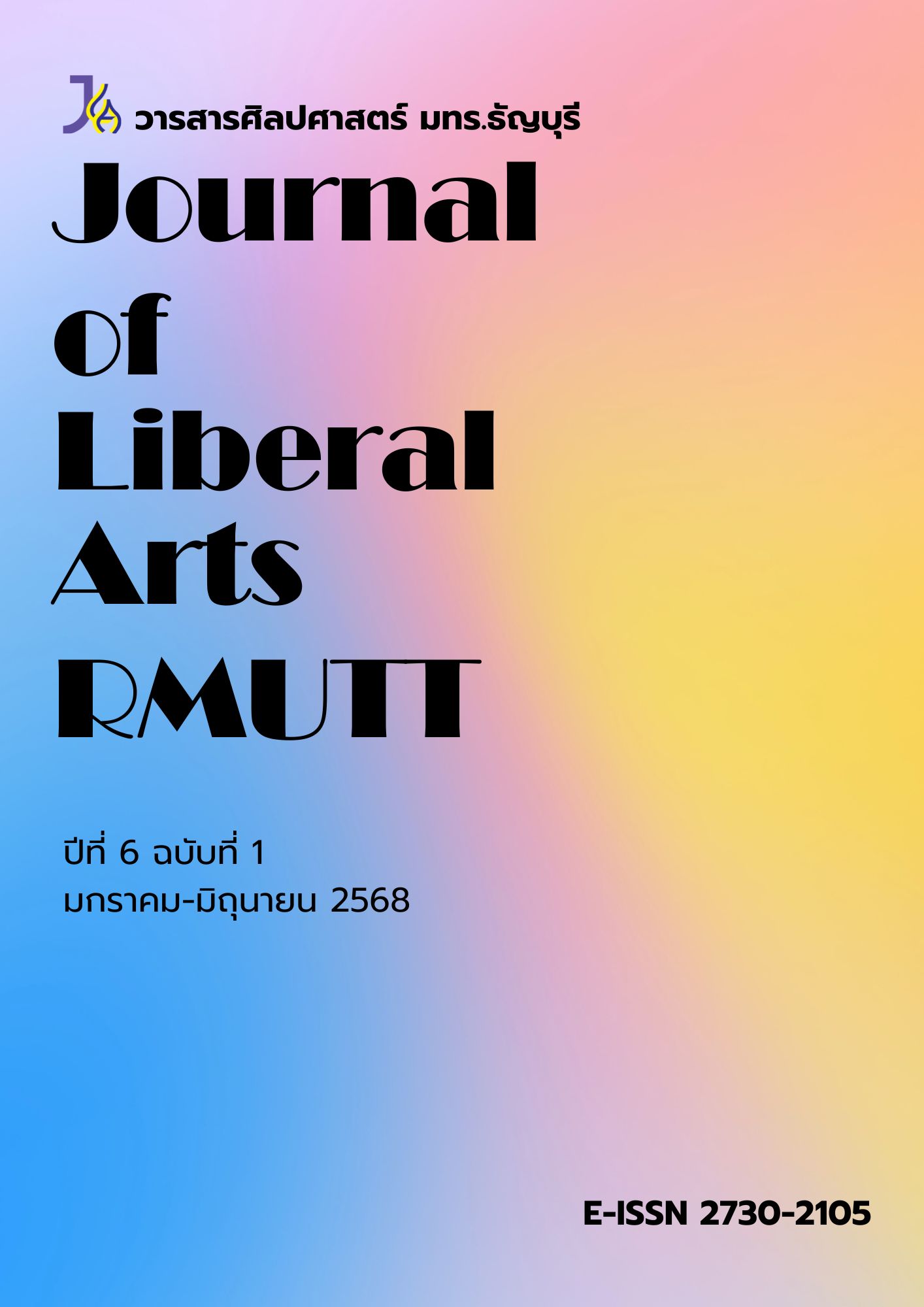Readiness of Thai Banking Employees for English Email Correspondence in International Trade Finance: Opportunities and Challenges
DOI:
https://doi.org/10.60101/jla.2025.6.1.6593Keywords:
Internationalization, banking communication, English proficiency, business correspondence, workplace readinessAbstract
As Thailand’s banking sector becomes increasingly integrated into the global economy, English proficiency has emerged as a vital skill for effective communication especially in international trade finance. This study investigated the readiness of Thai banking employees to use English for email communication in trade finance operations. Employing a mixed-methods approach, the research incorporated questionnaires, competency tests, and semi-structured interviews to assess language proficiency, challenges in written correspondence, and the impact of English skills on professional performance. The study involved 35 purposively selected banking employees. The findings indicated that while employees recognized the importance of English in their roles, they faced persistent difficulties with grammar, technical vocabulary, and complex sentence structures. Statistical analyses showed differences in language proficiency based on demographic factors, work experience, and exposure to international transactions. Despite these challenges, participants affirmed that email was the primary mode of workplace communication, highlighting the urgent need for improved writing skills to enhance clarity and professionalism. The study recommends the implementation of targeted English training programs, with a focus on writing and specialized vocabulary relevant to banking operations. Enhancing employees’ English proficiency can boost operational efficiency and support Thailand’s competitiveness in the global financial landscape. Addressing language barriers is therefore essential for ensuring smooth and internationally compliant trade finance transactions.
References
Agustina, V., Thamrin, N. R., & Oktoma, E. (2024). The role of English language proficiency in the global economy and business communication. International Journal Administration, Business & Organization, 5(4), 82-90. https://doi.org/10.61242/ijabo.24.423
Ai, B., Wang, L. & Zhang, J. (2018). Using English as economic capital in a Chinese–Australian workplace: Implications for teaching Business English in China. Journal of Teaching in International Business, 29(4), 272 - 288. https://doi.org/10.1080/08975930.2018.1557095
Boutellier, R., Ullman, F., Schreiber, J. & Naef, R. (2008). Impact of office layout on communication in a science‐driven business. R&d Management, 38(4), 372-391. https://doi.org/ 10.1111/j.1467-9310.2008.00524.x
Brad Shuck, M., Rocco, T. S. & Albornoz, C. A. (2011). Exploring employee engagement from the employee perspective: Implications for HRD. Journal of European Industrial Training, 35(4), 300-325.
Braun, V. & Clarke, V. (2006). Using thematic analysis in psychology. Qualitative Research in Psychology, 3(2), 77–101. https://doi.org/10.1191/1478088706qp063oa
Briguglio, C. (2005). Developing an Understanding of English as a Global Language for a Business Setting. In Francesca Bargiela-Chiappini and Maurizio Gotti (Eds.), Asian Business Discourses. (pp. 313-344). Peter Lang.
Chalapati, S. (2007). The internationalisation of higher education in Thailand: Case studies of two English-medium business graduate programs [Unpublished Doctoral Dissertation]. Royal Melbourne Institute of Technology, Australia.
Eugenio, S. J. (2010). Meaningful internationalization: A study among the leaders of Brazilian smaller enterprises [Master’s thesis, The University of Birmingham]. Tuwhera. https://openrepository.aut.ac.nz/handle/10292/12338
Farneste, M. & Pašinska, O. (2019). Developing peer corrective skills in business letter writing in English as a foreign language. Baltic Journal of English Language, Literature and Culture, 9, 29–45. https://doi.org/10.22364/BJELLC.09.2019.03
Finsel, J., Wöhrmann, A., Wang, M., Wilckens, M. & Deller, J. (2021). Organizational practices for the aging workforce: Validation of an English version of the later life workplace index. Innovation in Aging, 5, 826 - 827.
Hamilton, M. (2013). Autonomy and foreign language learning in a virtual learning environment. Bloomsbury Academic.
He, D. & Li, D. C. (2021). Glocalizing ELT reform in China: A perspective from the use of English in the workplace. RELC Journal, 54, 149-165. https://doi.org/10.1177/00336882211018499
Hejazi, W. & Ma, J. (2011). Gravity, the English language and international business. Multinational Business Review, 19(2), 152-167. https://doi.org/10.1108/15253831111149780
Jusoh, Z., Zubairi, A. M. & Badrasawi, K. J. (2018). Validity evidence using expert judgment: A study of using item congruence involving expert judgements for evidence for validity of a reading test. Al-Shajarah: Journal of the International Institute of Islamic Thought and Civilization (ISTAC), (Special Issue: Education 2018), 307-320. https://doi.org/10.31436/shajarah.v0i0.766
Khaled, S. B. & Bani-ahmad, A. (2019). The role of the balanced scorecard on performance: Case study of the Housing Bank for Trade and Finance. International Journal of Economics and Finance, 11(2), 17-26. https://doi.org/10.5539/ijef.v11n2p17
Manalastas, A. K. M. (2023). Communicative competence in a global hospitality workplace: Assessment of English language competency of BSHM graduating students. SEAQIL Journal of Language Education, 2(2), 1-7. https://doi.org/10.70046/sjle.2.2.1-7
Melitz, J. (2016). English as a Global Language. In V. Ginsburgh & S. Weber (Eds.), The Palgrave Handbook of Economics and Language. (pp. 583-615). Palgrave Macmillan UK.
Mohammed, I. & Bunyaminu, A. (2021). Major obstacles facing business enterprises in an emerging economy: The case of Ghana using the World Bank Enterprise Survey. Journal of Small Business and Enterprise Development, 28(3), 475–487. https://doi.org/10.1108/jSBED-04-2020-0110
Noom-ura, S. (2013). English-Teaching Problems in Thailand and Thai Teachers’ Professional Development Needs. English Language Teaching, 6(11), 139-147. https://doi.org/10.5539/elt.v6n11p139
Nuttall, L. (2019). Comparative education: Why does Japan continue to struggle with English. The Reading Matrix: An International Online Journal, 19(1), 74-92.
Oliveri, M. E. & McCulla, L. (2019). Using the occupational network database to assess and improve English language communication for the workplace. ETS. https://www.ets.org/research/policy_research_reports/publications/report/2019/kaiw.html?utm_source=chatgpt.com
Omer, W. K. H., Mohamed, A. M. & Al-Khresheh, M. H. (2025). The integration of English language skills in business education: Insights from accounting in the Saudi context. Journal of Teaching in International Business, 35(3–4), 130-158.
Pan, P. & Patel, C. (2018). The influence of native versus foreign language on Chinese subjects’ aggressive financial reporting judgments. Journal of Business Ethics, 150, 863-878. https://doi.org/10.1007/s10551-016-3165-z
Walden, J. (2019). Communicating role expectations in a coworking office. Journal of Communication Management, 23(4), 316-330. https://doi.org/10.1108/JCOM-09-2018-0097
Wright, C. M. (1983). Language and communication problems in an Asian community. The Journal of the Royal College of General Practitioners, 33(247), 101-104.
Zeng, J., Ponce, A. R. & Li, Y. (2023). English linguistic neo-imperialism in the era of globalization: A conceptual viewpoint. Frontiers in Psychology, 14, 1-9. https://doi.org/10.3389/fpsyg.2023.1149471
Downloads
Published
How to Cite
Issue
Section
License
Copyright (c) 2025 Journal of Liberal Arts RMUTT

This work is licensed under a Creative Commons Attribution-NonCommercial 4.0 International License.













